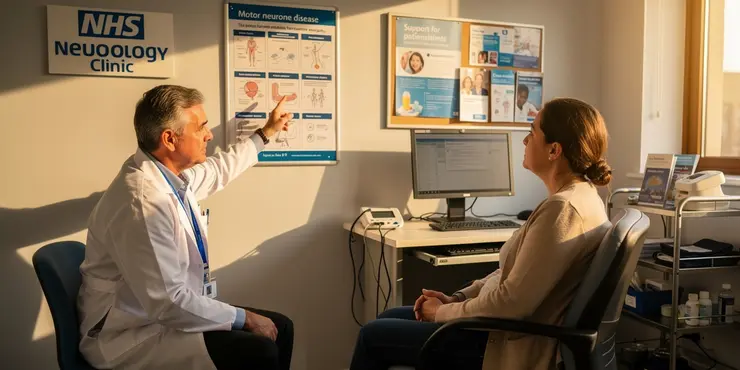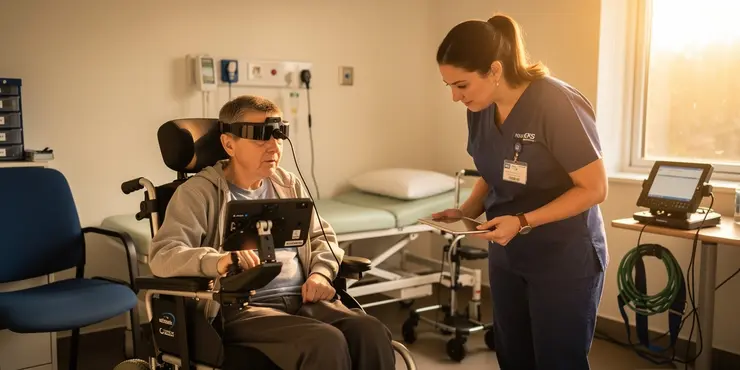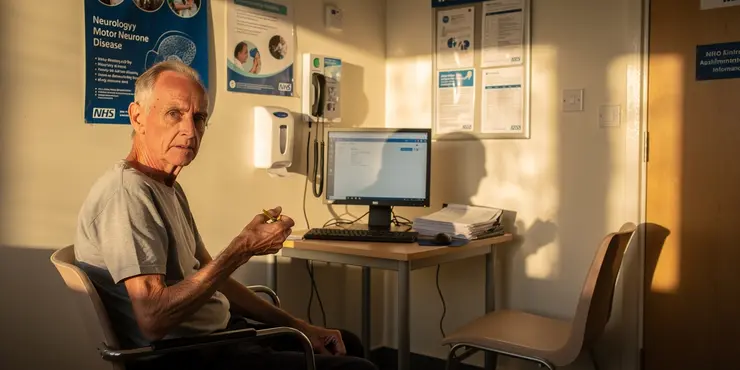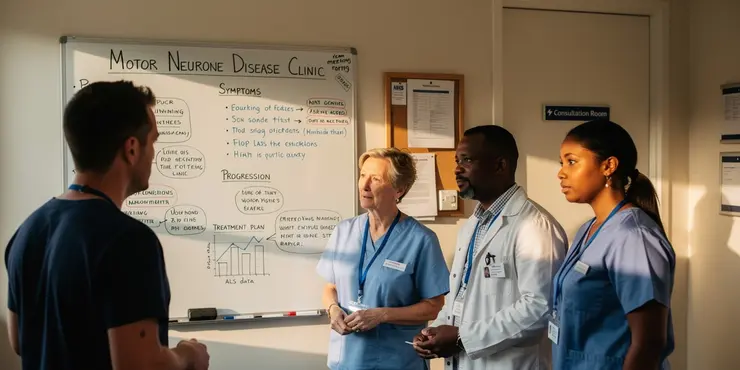
Find Help
More Items From Ergsy search
-

What causes motor neurone disease?
Relevance: 100%
-

What is motor neurone disease?
Relevance: 90%
-
Are there different types of motor neurone disease?
Relevance: 88%
-
Is motor neurone disease hereditary?
Relevance: 87%
-

Is there a cure for motor neurone disease?
Relevance: 84%
-

What are the primary symptoms of motor neurone disease?
Relevance: 80%
-

How is motor neurone disease diagnosed?
Relevance: 78%
-

How is breathing affected by motor neurone disease?
Relevance: 77%
-

What treatments are available for motor neurone disease?
Relevance: 76%
-

What role do genetics play in motor neurone disease?
Relevance: 76%
-

What assistive devices can help people with motor neurone disease?
Relevance: 75%
-

Motor neurone disease Julie's story | NHS
Relevance: 74%
-

How does motor neurone disease affect the body?
Relevance: 73%
-
How does motor neurone disease affect speech?
Relevance: 72%
-

How does motor neurone disease impact swallowing?
Relevance: 69%
-
Can lifestyle changes impact motor neurone disease progression?
Relevance: 67%
-

What is the life expectancy after a motor neurone disease diagnosis?
Relevance: 67%
-

Voice banking service helps people live with motor neurone disease
Relevance: 66%
-

How can caregivers support someone with motor neurone disease?
Relevance: 62%
-

Who is at risk for motor neurone disease?
Relevance: 57%
-

Are there support groups for individuals with motor neurone disease?
Relevance: 57%
-

What research is being done on motor neurone disease?
Relevance: 57%
-

What causes Huntington's disease?
Relevance: 46%
-

What causes Alzheimer's disease?
Relevance: 41%
-
How does Huntington's disease affect movement?
Relevance: 38%
-

What is MND?
Relevance: 38%
-
What is Parkinson's disease?
Relevance: 35%
-

Causes of coeliac disease
Relevance: 35%
-

What causes Crohn's disease?
Relevance: 34%
-

What causes flesh-eating disease?
Relevance: 33%
-

Can vaccines cause the diseases they protect against?
Relevance: 31%
-

Is Huntington's disease fatal?
Relevance: 31%
-

What causes chronic kidney disease?
Relevance: 31%
-

What research is being done on Huntington's disease?
Relevance: 31%
-

What are the symptoms of Huntington's disease?
Relevance: 30%
-
Can flesh-eating disease cause long-term complications?
Relevance: 29%
-

Can screw worms cause zoonotic disease?
Relevance: 28%
-

What is Huntington's disease?
Relevance: 28%
-

Can Huntington's disease be prevented?
Relevance: 26%
-

How does Huntington's disease affect emotions?
Relevance: 25%
Introduction to Motor Neurone Disease
Motor neurone disease (MND) is a progressive neurological disorder that affects the nerve cells responsible for controlling voluntary muscle activity, such as walking, speaking, and breathing. This condition leads to the degeneration and eventual death of motor neurones, which are crucial for transmitting signals from the brain to the muscles. Although MND is relatively rare, it has a profound impact on individuals and their families as the disease progresses.
Genetic Factors
Genetic factors play a significant role in the development of motor neurone disease. Approximately 5-10% of MND cases are hereditary, often referred to as familial MND. Several genes have been identified that are associated with an increased risk of developing the condition. Mutations in the C9orf72 gene are the most common genetic cause of MND, particularly in the UK and other European populations. Other significant genes include SOD1, TARDBP, and FUS. These genetic abnormalities disrupt normal cellular processes, leading to the degeneration of motor neurones.
Environmental Factors
While the exact environmental triggers for sporadic MND cases (those without a family history) are not yet fully understood, several factors have been suggested. Exposure to certain toxins, such as pesticides, heavy metals, and other environmental pollutants, might increase the risk. Occupational exposures, such as those experienced by military personnel or athletes, have also been studied, although conclusive evidence linking specific environments to MND is still lacking.
Age and Gender
Age is a confirmed risk factor for motor neurone disease, with most individuals being diagnosed between the ages of 50 and 70. The likelihood of developing MND increases as people age, although it can also occur in younger adults. Additionally, gender appears to influence the risk as well. Men are statistically more likely to develop MND compared to women, but the reasons for this gender disparity remain unclear.
Role of Autoimmune and Viral Factors
There is ongoing research into the role that the immune system and viral infections may play in the development of MND. Some studies suggest that an inappropriate or overactive immune response could contribute to nerve damage. Additionally, viral infections, through mechanisms such as molecular mimicry, may trigger autoimmune responses that inadvertently target motor neurones. However, more research is needed to clarify these complex interactions and their potential impact on MND development.
Conclusion
Motor neurone disease is a complex and multifactorial condition with no single identifiable cause in most cases. While genetics are a prominent factor in familial cases, a combination of genetic predispositions, environmental exposures, and possibly autoimmune or viral factors contribute to the sporadic form of the disease. Continued research is essential to unravel these intricate causes and to develop effective treatments for those affected by MND.
What Is Motor Neurone Disease?
Motor neurone disease (or MND) is an illness that makes it hard for your body to move. It stops your nerves from talking to your muscles, which makes it difficult to walk, talk, and even breathe. Over time, the nerves get weaker and eventually stop working. This disease can be very tough for people and their families.
Genes
Genes, which are like instructions inside our bodies, can make some people more likely to get MND. About 5 to 10 out of every 100 people with MND have it because of genes they got from their family. This is called familial MND. Some important genes that can cause MND are C9orf72, SOD1, TARDBP, and FUS. When these genes don't work right, it can make the nerves weak and sick.
The Environment
We are not sure exactly how the places where people live and work might cause MND, but some ideas have been suggested. Being around certain chemicals like pesticides or heavy metals might make people more likely to get MND. People in certain jobs, like soldiers or athletes, might be at higher risk, but we need more proof to be sure.
Age and Being Male
Getting older makes it more likely for someone to get MND. Most people find out they have MND between the ages of 50 and 70. Men are more likely to get MND than women, but we do not know exactly why.
The Body's Defenses and Viruses
Scientists are studying if the body's defense system (the immune system) and viruses might play a part in MND. Sometimes the body's defenses might attack its own nerves by mistake, and viruses might confuse the body into doing this. We still need more research to understand if these ideas are true.
In Summary
Motor neurone disease is a complicated illness and we do not know exactly what causes it for most people. Genes are important for some families, but there might be other things like chemicals or germs involved too. Scientists are working hard to figure out more about MND and how to help people with it.
Frequently Asked Questions
What is the primary cause of motor neurone disease?
The exact cause of motor neurone disease (MND) is not known, but it is believed to involve a combination of genetic and environmental factors.
Are there genetic factors involved in motor neurone disease?
Yes, approximately 5-10% of motor neurone disease cases are familial, meaning they are caused by genetic mutations passed down through families.
Can environmental factors contribute to the development of motor neurone disease?
Yes, some research suggests that environmental exposures, such as toxins or viruses, may play a role in triggering motor neurone disease.
Is motor neurone disease hereditary?
While most cases are sporadic with no family history, a small percentage are hereditary and linked to mutations in certain genes.
Which genes are linked to familial motor neurone disease?
Some of the known genes linked to familial MND include SOD1, C9orf72, TARDBP, and FUS, among others.
Does age affect the likelihood of developing motor neurone disease?
Yes, the risk of developing motor neurone disease increases with age, most commonly occurring in people between the ages of 50 and 70.
Are men or women more likely to develop motor neurone disease?
Men are slightly more likely to develop motor neurone disease compared to women.
Can lifestyle factors impact the risk of developing motor neurone disease?
There is limited evidence on lifestyle factors, but some studies suggest that smoking and heavy exercise might be associated with an increased risk.
How does a genetic mutation cause motor neurone disease?
Genetic mutations may lead to the abnormal functioning of motor neurons, which eventually results in their death and the progression of MND.
Is there a link between motor neurone disease and military service?
Some studies have found an association between military service and an increased risk of developing motor neurone disease, though the reasons for this are not fully understood.
Does exposure to chemicals increase the risk of motor neurone disease?
Some environmental studies suggest that exposure to certain chemicals, such as pesticides, may be associated with a higher risk of MND.
Can viral infections trigger motor neurone disease?
There is some evidence to suggest that viral infections might trigger the immune system and contribute to motor neuron damage, though more research is needed.
Are there any known preventive measures for motor neurone disease?
Currently, there are no known ways to prevent motor neurone disease, but research is ongoing to understand potential risk factors.
What role does oxidative stress play in motor neurone disease?
Oxidative stress can damage cells and is thought to contribute to the degeneration of motor neurons in MND.
Is there a connection between head trauma and motor neurone disease?
Some studies have suggested a link between repeated head trauma and an increased risk of developing motor neurone disease, but evidence is inconclusive.
Are there dietary factors that influence motor neurone disease risk?
Research is ongoing regarding diet, but there is no strong evidence that specific dietary factors significantly affect MND risk.
How does glutamate affect motor neurone disease development?
Excessive accumulation of glutamate, a neurotransmitter, is thought to contribute to motor neuron damage in MND.
Does stress play a role in the development of motor neurone disease?
While stress can impact overall health, there is no direct evidence linking stress to the development of MND.
What research is being done to understand the causes of motor neurone disease?
Research is focused on exploring genetic factors, environmental exposures, and biological mechanisms to better understand the causes of MND.
Does having a family member with motor neurone disease increase your risk?
If MND is present in the family (familial MND), there may be an increased risk, especially if specific genetic mutations are involved.
What causes motor neurone disease?
Motor neurone disease happens when brain and nerve cells stop working. Scientists are not sure why this happens, but it might be genetic or from the environment.
If reading is hard, using tools like audiobooks or videos can help. They can explain things in a different way, which might be easier to understand.
The exact reason why people get motor neurone disease (MND) is not known. But scientists think it is a mix of things from our genes and the world around us.
Do genes cause motor neurone disease?
Some people get motor neurone disease because of their genes. Genes are like a map inside our bodies that tell us how to grow and work. If there is a problem in the genes, it can sometimes lead to motor neurone disease.
If someone in your family has motor neurone disease, it might run in the family. This means you could get it too because of your genes.
It's a good idea to talk to a doctor. They can help you understand more and tell you what to do next.
Using pictures or videos can help understand better. Also, talking to someone who knows about this disease can be helpful.
Yes, about 5 to 10 out of every 100 people with motor neurone disease got it because of their family's genes. This means it can run in families.
Can things around us cause motor neurone disease?
Some things in the world might make motor neurone disease more likely. This includes what we breathe, eat, or touch.
Here are some tools or ways to help understand:
- Use pictures to show ideas.
- Ask someone to read with you.
- Take breaks when reading.
- Highlight important words.
Yes, some studies show that things in the environment, like harmful chemicals or viruses, might help cause motor neurone disease.
Can you get motor neurone disease from family?
Some people might get motor neurone disease from their parents or family. This is called hereditary. But not everyone gets it this way. If you are worried, talk to a doctor. They can help and answer questions.
Most of the time, these cases happen randomly and don't run in families. But sometimes, they are passed down in families because of changes in certain genes.
What genes are connected to family motor neuron disease?
Genes are like instructions in our body. They tell our body how to work. Sometimes, these instructions can change and cause diseases.
Familial motor neuron disease is a sickness that affects how our muscles move. It can run in families.
Here are some tips to understand this better:
- Use pictures or diagrams to see how genes work.
- Ask a teacher or parent to help explain.
- You can use apps or websites that explain science in simple words.
Scientists have found some genes that can lead to MND (Motor Neurone Disease) in families. These genes have names like SOD1, C9orf72, TARDBP, and FUS.
Does how old you are change the chance of getting motor neurone disease?
Yes, getting motor neurone disease is more likely as you get older. It usually happens to people who are between 50 and 70 years old.
Who is more likely to get motor neurone disease, men or women?
Motor neurone disease is an illness that affects the nerves in the body.
Doctors have found that men are more likely to get motor neurone disease than women.
If you want to know more, you can ask a doctor or look at health websites.
Boys get motor neurone disease a little more often than girls.
Can the way we live change the chance of getting motor neurone disease?
Our daily habits, like what we eat, how much we exercise, and if we smoke, can affect our health. These habits might also change the chance of getting illnesses like motor neurone disease.
Here are some tips to help:
- Eat healthy food like fruits and vegetables.
- Stay active by playing or doing sports.
- Avoid smoking and too much alcohol.
You can also talk to a doctor or a health expert if you have questions. They can give good advice and tell you more about staying healthy.
We don't know a lot about how daily habits affect health, but some studies show that smoking and doing lots of heavy exercise might make health risks go up.
How does a change in genes cause motor neurone disease?
A change in the genes is like a small mistake in a big recipe book.
This mistake can make the body's tiny parts, called cells, not work properly.
When cells that help muscles do not work, it can cause motor neurone disease.
This disease makes it hard for people to move and talk.
Tools like picture books or apps can help you learn more.
Changes in genes can make nerve cells work wrongly. This can make them die. When this happens, it can make MND (a disease) get worse.
Is there a connection between muscle nerve disease and being in the military?
People want to know if working in the military can cause muscle nerve disease.
This muscle disease makes it hard to move, talk, or even swallow.
If you are worried or have questions, you can:
- Talk to your doctor.
- Ask a nurse for help.
- Join support groups to meet others with the same illness.
Some studies show that people in the military might have a higher chance of getting a disease called motor neurone disease. But scientists do not know why this happens.
Can being around chemicals make it more likely to get motor neurone disease?
Some studies about the environment say that being around certain chemicals, like those used to kill pests, might make it more likely to get MND, which is a nerve disease.
Do viruses cause problems with nerve cells that move muscles?
Sometimes, tiny germs called viruses can make us sick. Some people wonder if these viruses can cause a serious illness called motor neurone disease. This disease affects the nerve cells that help our muscles move.
If you want to learn more about this topic, it can help to:
- Watch simple videos about how viruses and nerve cells work.
- Talk to a doctor or nurse for clear answers.
- Read picture books about the body and how it works.
Some doctors think that viruses might harm our body's cells that help us move. Viruses could make the body's defense system, the immune system, attack these cells. We need to learn more about this.
Here are some tips to help with reading:
- Read slowly and take your time.
- Use a ruler or your finger to keep your place while reading.
- Try reading out loud with someone else.
Can you stop motor neurone disease?
Motor neurone disease is also called MND. We do not know how to stop MND from happening.
Here are some tips that might help:
- Eat healthy food.
- Exercise often.
- Don't smoke.
- Try to stay happy and calm.
If you need help, ask a doctor or nurse. They can give you advice.
Right now, we do not know how to stop motor neurone disease from happening. But scientists are working hard to learn more about what might cause it.
How does stress in the body affect motor neurone disease?
Motor neurone disease (MND) is a sickness that harms the cells that control muscles. Stress inside the body can make MND worse.
Here is how it works:
- When our body breaks down food or fights germs, it makes tiny things called 'free radicals.'
- Too many free radicals can hurt our body. This is called 'oxidative stress.'
- Oxidative stress can damage motor neurones, the cells that help us move muscles.
If you find this hard, try these:
- Ask someone to read it with you.
- Use pictures to understand better.
- Break it down into small bits.
Oxidative stress can hurt cells. It might also help cause the damage to motor neurons in MND.
Is there a link between hurting your head and getting motor neurone disease?
Some studies say that hitting your head a lot might make it more likely to get a disease that affects your muscles and nerves. But we are not sure if this is true.
Can what we eat affect the chance of getting motor neurone disease?
People are still studying how food might change the chances of getting MND. But right now, we don't have strong proof that certain foods make a big difference.
How does glutamate affect the growth of motor neurone disease?
Glutamate is a chemical in the brain that helps send messages between nerve cells.
In motor neurone disease, too much glutamate can harm nerve cells.
This can make the disease worse over time.
For more help understanding, you can:
- Ask someone to explain with simple words.
- Use pictures to learn about brain and nerve cells.
- Listen to audio recordings on this topic.
Too much glutamate can hurt the nerves that help us move. This might cause problems in MND (which stands for Motor Neuron Disease).
Here's a tip: Using a tool that reads out loud can help you understand this better. Listening to the text can make it easier to follow.
Can stress cause motor neurone disease?
Motor neurone disease is a serious illness. Some people ask if stress can cause it.
Experts are not sure if stress causes motor neurone disease. Stress can make people feel tired and unhappy, but we do not know if it causes this illness.
Talking to a doctor can help. They can answer questions and give support.
Stress can make you feel sick, but it does not cause MND. MND is a disease that affects the nerves in the brain and spine.
What are people studying to find out why motor neurone disease happens?
Scientists are looking into genes and how they can cause MND, as well as things like pollution that might also be important. They want to learn what happens inside the body with MND.
Using pictures and listening to information can help understand better. Trying to talk about what you learn with someone else can also help.
Can you get motor neurone disease if a family member has it?
If someone in your family has MND (a sickness that makes muscles weak), other family members might have a higher chance of getting it too. This is more likely if there are changes in the genes (tiny parts inside our body that carry information) that cause MND.
Useful Links
This website offers general information and is not a substitute for professional advice.
Always seek guidance from qualified professionals.
If you have any medical concerns or need urgent help, contact a healthcare professional or emergency services immediately.
Some of this content was generated with AI assistance. We’ve done our best to keep it accurate, helpful, and human-friendly.
- Ergsy carfully checks the information in the videos we provide here.
- Videos shown by Youtube after a video has completed, have NOT been reviewed by ERGSY.
- To view, click the arrow in centre of video.
- Most of the videos you find here will have subtitles and/or closed captions available.
- You may need to turn these on, and choose your preferred language.
- Go to the video you'd like to watch.
- If closed captions (CC) are available, settings will be visible on the bottom right of the video player.
- To turn on Captions, click settings .
- To turn off Captions, click settings again.
More Items From Ergsy search
-

What causes motor neurone disease?
Relevance: 100%
-

What is motor neurone disease?
Relevance: 90%
-
Are there different types of motor neurone disease?
Relevance: 88%
-
Is motor neurone disease hereditary?
Relevance: 87%
-

Is there a cure for motor neurone disease?
Relevance: 84%
-

What are the primary symptoms of motor neurone disease?
Relevance: 80%
-

How is motor neurone disease diagnosed?
Relevance: 78%
-

How is breathing affected by motor neurone disease?
Relevance: 77%
-

What treatments are available for motor neurone disease?
Relevance: 76%
-

What role do genetics play in motor neurone disease?
Relevance: 76%
-

What assistive devices can help people with motor neurone disease?
Relevance: 75%
-

Motor neurone disease Julie's story | NHS
Relevance: 74%
-

How does motor neurone disease affect the body?
Relevance: 73%
-
How does motor neurone disease affect speech?
Relevance: 72%
-

How does motor neurone disease impact swallowing?
Relevance: 69%
-
Can lifestyle changes impact motor neurone disease progression?
Relevance: 67%
-

What is the life expectancy after a motor neurone disease diagnosis?
Relevance: 67%
-

Voice banking service helps people live with motor neurone disease
Relevance: 66%
-

How can caregivers support someone with motor neurone disease?
Relevance: 62%
-

Who is at risk for motor neurone disease?
Relevance: 57%
-

Are there support groups for individuals with motor neurone disease?
Relevance: 57%
-

What research is being done on motor neurone disease?
Relevance: 57%
-

What causes Huntington's disease?
Relevance: 46%
-

What causes Alzheimer's disease?
Relevance: 41%
-
How does Huntington's disease affect movement?
Relevance: 38%
-

What is MND?
Relevance: 38%
-
What is Parkinson's disease?
Relevance: 35%
-

Causes of coeliac disease
Relevance: 35%
-

What causes Crohn's disease?
Relevance: 34%
-

What causes flesh-eating disease?
Relevance: 33%
-

Can vaccines cause the diseases they protect against?
Relevance: 31%
-

Is Huntington's disease fatal?
Relevance: 31%
-

What causes chronic kidney disease?
Relevance: 31%
-

What research is being done on Huntington's disease?
Relevance: 31%
-

What are the symptoms of Huntington's disease?
Relevance: 30%
-
Can flesh-eating disease cause long-term complications?
Relevance: 29%
-

Can screw worms cause zoonotic disease?
Relevance: 28%
-

What is Huntington's disease?
Relevance: 28%
-

Can Huntington's disease be prevented?
Relevance: 26%
-

How does Huntington's disease affect emotions?
Relevance: 25%


